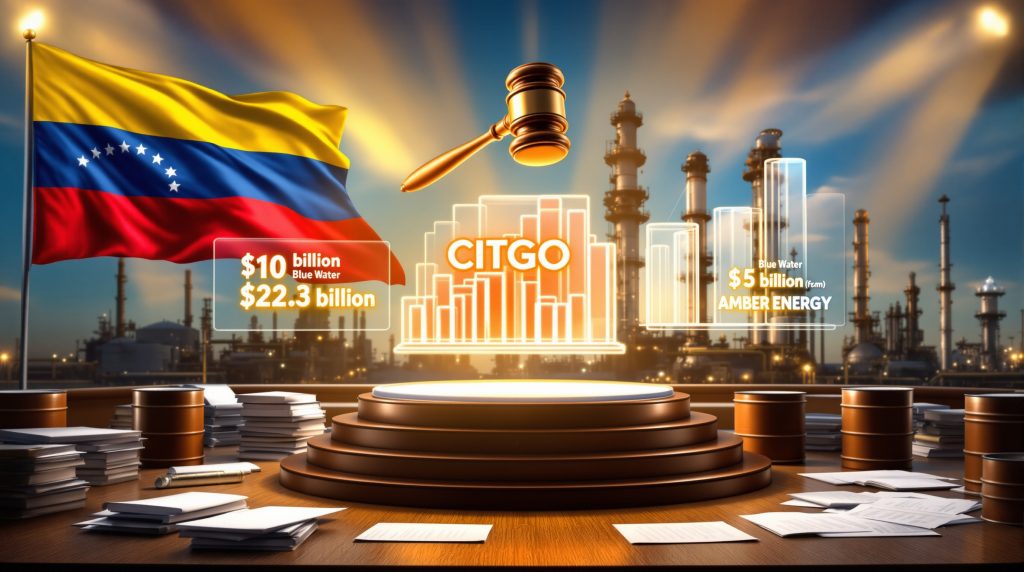Understanding the Strategic Importance of Citgo's Auction Process
The Citgo auction Venezuela faces represents far more than a simple corporate transaction. This complex legal battle has transformed Venezuela's most valuable overseas petroleum asset into the centerpiece of an international debt recovery case that could reshape sovereign asset precedents across global markets.
Critical Auction Metrics:
- Refining Capacity: Citgo operates three major U.S. refineries with combined daily processing capacity exceeding 800,000 barrels
- Geographic Footprint: Strategic locations in Louisiana, Illinois, and Texas provide critical Gulf Coast and Midwest market access
- Asset Valuation: Court-ordered sale process values the company between $7-10 billion based on current bidding activity
- Creditor Claims: Multiple international creditors seeking recovery through U.S. court system
The auction process operates under strict federal court supervision, with Judge Leonard P. Stark of the U.S. District Court for the District of Delaware overseeing proceedings. This legal framework ensures creditor claims against Venezuela and its state oil company PDVSA receive proper adjudication through American judicial channels.
Technical Infrastructure Assessment
Citgo's refining network processes diverse crude oil feedstocks, making ownership changes potentially significant for regional energy security. The Lake Charles refinery alone handles over 400,000 barrels daily, representing substantial processing capacity within U.S. petroleum infrastructure.
Refinery Specifications:
| Facility | Daily Capacity | Primary Products | Strategic Importance |
|---|---|---|---|
| Lake Charles, LA | 425,000 bpd | Gasoline, diesel, jet fuel | Gulf Coast hub |
| Lemont, IL | 167,600 bpd | Refined products | Midwest distribution |
| Corpus Christi, TX | 157,000 bpd | Marine fuels, exports | Port access |
How Did Venezuela Lose Control of Its Crown Jewel Asset?
Venezuela's path to losing Citgo began with desperate financial decisions during the country's economic collapse. Furthermore, the Maduro government pledged Citgo shares as collateral for PDVSA bond issuances, creating legal pathways for creditors to pursue the company when Venezuela defaulted on its international obligations.
Timeline of Asset Control Loss:
- 2016-2017: PDVSA issues bonds using Citgo shares as security collateral
- 2018: Venezuela begins missing bond payments as economic crisis deepens
- 2019: U.S. sanctions transfer Citgo board control to Venezuelan opposition representatives
- 2021: Federal court authorizes creditor pursuit of Citgo assets
- 2023: Formal auction process initiated under court supervision
- 2024-2025: Active bidding phase with multiple competing offers
Legal Framework Behind the Forced Sale
The court-mandated auction operates under established U.S. bankruptcy and commercial law principles, despite involving a foreign sovereign entity. However, federal courts possess jurisdiction because Citgo operates as a Delaware-incorporated company with substantial U.S. business operations.
Key Legal Mechanisms:
- Security Interest Enforcement: Creditors exercise rights under bond indentures that pledged Citgo shares
- Federal Court Jurisdiction: Delaware incorporation provides legal venue for proceedings
- Creditor Priority Systems: Court establishes payment hierarchies based on claim seniority
- Asset Valuation Process: Independent financial advisers assess company worth for distribution
Who Are the Major Players Competing for Citgo?
The Citgo auction Venezuela battle features diverse bidding groups, each bringing different strategic approaches and financial structures to acquire this petroleum refining prize. In addition, these developments mirror broader industry consolidation trends affecting energy markets globally.
Elliott Management's Amber Energy Consortium
Amber Energy, backed by Elliott Management's substantial resources, emerged as a leading contender with a cash-focused acquisition proposal. Elliott's involvement brings institutional credibility and proven energy sector investment experience to the bidding process.
Amber Energy Advantages:
- Financial Backing: Elliott Management's multi-billion dollar hedge fund resources
- Cash Certainty: Immediate payment capability reduces transaction complexity
- Operational Expertise: Established track record managing energy infrastructure investments
- Creditor Relations: Strong relationships with institutional bondholders and financial creditors
Alternative Bidding Groups
Several other consortiums have submitted competing proposals, each targeting different aspects of Citgo's value proposition. These include private equity groups, energy companies, and specialized distressed asset investors seeking to capitalise on the forced sale opportunity.
Bidder Categories:
- Financial Buyers: Private equity firms seeking operational improvements and strategic exits
- Strategic Acquirers: Existing refiners pursuing scale and market expansion
- Distressed Specialists: Investors focused on undervalued asset opportunities
- International Groups: Foreign companies seeking U.S. refining market entry
What Legal Challenges Are Delaying the Auction Process?
The Citgo auction faces multiple procedural hurdles that extend timelines and complicate final resolution. These challenges stem from the complexity of sovereign asset recovery and disputed fee arrangements, as detailed in Reuters' analysis of the litigation.
Adviser Fee Disputes
Gold Reserve Inc., a significant creditor in the proceedings, has challenged substantial advisory fees charged to the estate. These disputes centre on whether financial advisory costs represent reasonable expenses or excessive charges that reduce creditor recoveries.
Fee Dispute Issues:
- Cost Allocation: Questions over how advisory expenses should be distributed among creditor groups
- Conflict of Interest: Allegations that advisers have competing loyalties affecting their recommendations
- Fee Reasonableness: Challenges to the total compensation amount relative to transaction complexity
- Procedural Delays: Court time required to resolve fee disputes before auction completion
Regulatory Approval Requirements
Any successful Citgo bidder must navigate complex federal and state regulatory approval processes before completing the acquisition. Consequently, these requirements add substantial time to the transaction timeline.
Required Regulatory Clearances:
- CFIUS Review: Committee on Foreign Investment screening for national security implications
- Antitrust Analysis: Department of Justice and FTC competitive impact assessment
- State Environmental Permits: Louisiana, Illinois, and Texas environmental agency approvals
- Energy Regulatory Compliance: Federal and state petroleum industry oversight requirements
How Will the Auction Impact Venezuela's Economic Recovery?
The Citgo sale represents Venezuela's final major international asset liquidation, with proceeds potentially providing limited debt relief while eliminating future revenue streams that could support economic recovery. Furthermore, this situation reflects broader global trade impacts affecting sovereign assets worldwide.
Economic Implications Assessment:
| Impact Category | Short-term Effect | Long-term Consequence |
|---|---|---|
| Debt Relief | Partial creditor payments | Remaining obligations exceed proceeds |
| Revenue Loss | Immediate dividend elimination | Permanent income stream reduction |
| Asset Portfolio | Reduced international holdings | Minimal overseas collateral remaining |
| Credit Standing | Modest improvement from settlement | Limited access to international capital markets |
Regional Energy Security Considerations
Citgo's strategic location within U.S. refining infrastructure makes ownership changes potentially significant for domestic energy security planning. For instance, the facilities process various crude oil grades and supply critical petroleum products to regional markets, aligning with broader energy security trends across the industry.
Energy Security Factors:
- Refining Capacity: Substantial processing capability within U.S. domestic infrastructure
- Product Distribution: Existing pipeline and logistics networks serving multiple states
- Crude Oil Sources: Flexibility to process domestic and imported feedstocks
- Market Integration: Established relationships with wholesale and retail fuel distributors
What Does This Mean for International Creditors?
The Citgo auction outcome will establish important precedents for sovereign debt recovery and international asset enforcement mechanisms, particularly regarding state-owned enterprises operating in U.S. markets.
Recovery Rate Expectations
Creditors face significant challenges in achieving full recovery given the gap between total claims and likely sale proceeds. Recovery rates will vary substantially based on claim priority and legal seniority within the creditor structure.
Creditor Recovery Analysis:
- Secured Bondholders: Priority claims with collateral backing may achieve higher recovery percentages
- Judgment Creditors: Court-awarded claims receive treatment based on judgment dates and enforcement actions
- Unsecured Creditors: Lower priority positions face substantial recovery shortfalls
- Trade Creditors: Commercial claimants likely receive minimal distributions after senior obligations
Precedent Setting for Sovereign Asset Cases
The Citgo auction Venezuela proceedings demonstrate how pledged sovereign assets can be successfully pursued through U.S. court systems, potentially encouraging similar enforcement actions against other defaulted sovereign borrowers. This development forms part of broader industry evolution patterns affecting resource sector governance.
Legal Precedent Implications:
- Collateral Enforcement: Strengthened creditor rights to pursue pledged sovereign assets
- Jurisdictional Framework: Clarified federal court authority over foreign state enterprises
- Recovery Mechanisms: Established procedures for complex multi-creditor asset liquidations
- International Relations: Balanced approach between creditor rights and diplomatic considerations
When Will the Auction Process Conclude?
Current projections indicate the Citgo auction Venezuela proceedings will extend through 2025 and potentially into 2026, accounting for appeals, regulatory reviews, and operational transition requirements.
Remaining Timeline Projections:
- Q4 2025: Final bid evaluation and winner selection process
- Q1 2026: Regulatory approval proceedings and compliance reviews
- Q2 2026: Appeals resolution and legal challenge outcomes
- Q3 2026: Final ownership transfer and operational transition completion
Potential Appeal Scenarios
Venezuela retains legal rights to challenge auction proceedings through various appellate mechanisms, potentially extending the timeline beyond current court projections. These challenges could focus on procedural issues, valuation disputes, or fundamental jurisdictional questions.
Appeal Possibilities:
- Valuation Challenges: Disputes over asset pricing and bidding process fairness
- Jurisdictional Issues: Questions regarding federal court authority over sovereign assets
- Procedural Objections: Claims about inadequate notice or flawed legal procedures
- International Law Arguments: Sovereign immunity and diplomatic protection assertions
What Are the Broader Implications for Sovereign Asset Recovery?
The Citgo auction establishes critical precedents for international creditors seeking to recover assets from sovereign debtors through U.S. legal systems, demonstrating both opportunities and limitations in cross-border enforcement. Moreover, as OilPrice reports, "The battle for Citgo has become increasingly contentious as Venezuela fights to retain control of its most valuable overseas asset."
Geopolitical Ramifications
The proceedings highlight complex tensions between economic sanctions enforcement, creditor recovery rights, and international diplomatic relationships, particularly regarding competing claims to Venezuelan government legitimacy.
International Relations Impact:
- Sanctions Coordination: Alignment between Treasury Department policies and court proceedings
- Diplomatic Recognition: Questions over which Venezuelan government entities have legal standing
- Regional Stability: Implications for other Latin American sovereign debt situations
- Investment Climate: Effects on international lending to emerging market sovereigns
Market Psychology and Investment Strategies
The auction demonstrates how sovereign debt markets price political risk and asset recovery potential, influencing future lending decisions and risk assessment methodologies for emerging market investments.
Investment Strategy Considerations:
- Collateral Analysis: Enhanced due diligence on sovereign asset pledges and enforceability
- Jurisdiction Shopping: Strategic venue selection for international debt recovery actions
- Portfolio Diversification: Risk management approaches for sovereign exposure concentrations
- Recovery Timing: Long-term investment horizons required for complex enforcement actions
Conclusion: Venezuela's Final Energy Asset Battle
The Citgo auction Venezuela represents a definitive conclusion to the country's control over international energy assets, marking a fundamental shift from state petroleum ownership to private control under U.S. legal jurisdiction. While creditors may achieve partial debt recovery through the sale proceeds, Venezuela faces permanent loss of its most valuable overseas asset and the revenue streams that could have supported future economic recovery efforts.
This complex legal battle extends beyond immediate financial implications, establishing frameworks for sovereign asset recovery that will influence international lending practices and cross-border enforcement mechanisms for years to come. Consequently, the outcome demonstrates both the long-term consequences of using strategic national assets as international debt collateral and the evolving relationship between economic sanctions, creditor rights, and diplomatic considerations in an interconnected global economy.
The resolution of this case will resonate throughout emerging market debt circles, providing crucial guidance for both sovereign borrowers and international creditors navigating the intersection of political risk, legal enforcement, and asset recovery in complex cross-border transactions.
Ready to Capitalise on Geopolitical Energy Market Shifts?
Discovery Alert's proprietary Discovery IQ model delivers real-time notifications on significant ASX mineral discoveries, empowering subscribers to identify actionable opportunities ahead of broader market movements during periods of global energy and resource sector volatility. Begin your 30-day free trial today to gain immediate insights into emerging resource investments whilst geopolitical developments reshape international energy markets.




